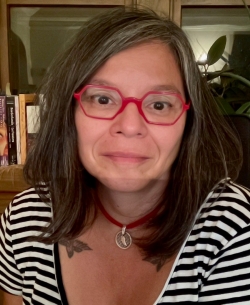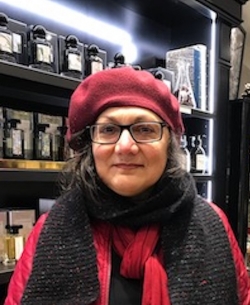
In this presentation I examine photographs from photojournalist Verónica Gabriela Cárdenas’s photographic series, Del Rio, documenting the 2021 migrant caravan of primarily Haitians as they settle in the Acuña-Del Rio International bridge in the Mexico-U.S. border. Inspired by José Esteban Muñoz’s notion of feeling brown, I read the photographs in light of the notion of flowing brownness, a literal movement of bodies of color as well as an affective link shared by bodies of color across different races. I read these caravans, originally connected to the Stations of the Cross or Way of Sorrows, as contemporary crossings of bodies of colors, in which the cross symbolizes different aspects of migration: literally crossing a border; the desires and hopes intersecting in the migrant’s body with acts that impede their movement; and being crossed-out as in perishing. I read Cárdenas's photographs as carnal in so far as they are the sensory circuits through which feeling brown is transmitted. This reading of the photographs informed by Muñoz’s notion of feeling brown opens the possibility for a promising aesthetic unsettlement in which the Mexico-U.S. border and border experience may be reinterpreted so as to to avoid the invisibilizing of Black Latinidad that is common in discussions of U.S. borderlands. It also highlights the heterogeneous, communal, and coalitional aspect of feeling brown.

Website: https://marianaortega.academia.edu/
Mariana Ortega is Associate Professor of Philosophy; Women’s, Gender, and Sexualities Studies; and Latino/a Studies at Penn State University. She works on Latina/x Feminisms, Phenomenology, Critical Philosophy of Race, and Aesthetics. She is the author of In-Between: Latina Feminist Phenomenology, Multiplicity, and the Self (SUNY, 2016), and co-editor with Andrea Pitts and José Medina of Theories of the Flesh: Latinx and Latin American Feminisms, Transformation and Resistance (Oxford University Press 2020), and with Linda Martín Alcoff of Constructing the Nation: A Race and Nationalism Reader (SUNY, 2009). She is completing a book-length project that examines the role of photography in practices of othering, self-transformation, memorialization, and mourning in the context of Latinidad. She is also working (with Helen Fielding) on an anthology of phenomenology and aesthetics.

Website: https://ethnicstudies.berkeley.edu/people/laura-perez-1/
Laura Elisa Pérez is the author of Chicana Art: The Politics of Spiritual and Aesthetic Altarities (Duke University Press 2007); Eros Ideologies: Writings on Art, Spirituality, and the Decolonial (Duke University Press 2019); Consuelo Jimenez Underwood: Art, Weaving, Vision (Duke University Press 2022), co-edited with Ann Marie Leimer; and the exhibition catalog Amalia Mesa-Bains: Archaeology of Memory (University of California Press and Berkeley Art Museum and Pacific Film Archive 2023), co-edited with María Esther Fernández. She curated Chicana Badgirls: Las Hociconas (2009), with Delilah Montoya; Labor+a(r)t+orio: Bay Area Latina@ Arts Now (2011); and the traveling retrospective Amalia Mesa-Bains: Archaeology of Memory (2023-25), with María Esther Fernández. She is Professor in Chicanx, Latinx, and Ethnic Studies and Chair of the Latinx Research Center at the University of California, Berkeley. She received her PhD at Harvard University and a BA/MA Joint Degree at The University of Chicago.